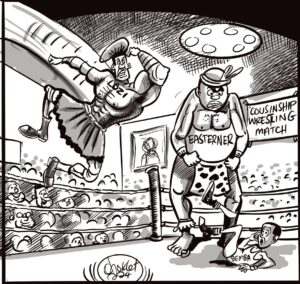Former Finance Minister Felix Mutati says the African Continental Free Trade Area (ACFTA) Agreement will give meaning to the African Union’s 2063 Agenda if well implemented.
In an interview, Mutati said the opening up of the AFTA Agreement would be the biggest game-changer in terms of improving Africa’s socio-economic fortunes, especially at a time when there were challenges regarding multilateral trade.
The AU’s 2063 Agenda seeks to build a prosperous and united Africa based on shared values and a common destiny.
“People have been folding their hands and protecting their territories, so the coming of the Continental Free Trade Area is a bright spot in that particular contest. It is also quite clear that it will face a number of challenges in terms of its implementation for a number of reasons. We can either approach it through the consolidation of the economic blocks, for example, consolidating COMESA, consolidating SADC and the East African Community into one block and dealing with the challenges around trade in that consolidated space. But even within that space, there are challenges, for example, you have within COMESA, something called ‘rules of operation’. In COMESA, they have a general rule of origin that, provided a product is produced by a COMESA country and there is value addition at up to 35 per cent, it will be treated duty-free and tax-free when it’s exported to another country. When you go to SADC, the same issues, they say, ‘for us, it’s item by item. We shall look at each item’. So the problem then becomes, how do you compromise the differences in the treatment of certain transactions within an economic block to facilitate trade?” Mutati wondered.
“Secondly, there are issues around what are called: ‘non-trade barriers’. Your non-trade barriers are even simple things around documentation for crossing borders. Between borders, every economic grouping has got a framework of documents that they use for border transiting. Taking those and reconciling them with another economic block is becoming a lot more difficult. In a number of African countries, there is also what we may call ‘protecting infant industries,’ that, my particular industry hasn’t grown strong enough to be able to fight the others. But those must be treated from an African perspective as building blocks for the Continental Free Trade Area. So, we need to have a positive mind-set that our colleagues in other continents went through the same challenges and have been able to create a solution around them. So, they are not insurmountable…If you ask me, putting on my previous hat as Commerce Minister when we used to engage, I feel it is possible to have the African Continental Free Trade Area, and that is what is going to give meaning to the AU Agenda 2063. Otherwise, if you don’t do that, then what is Agenda 2063? Is it an agenda of continuous conversations about intentions, not about doing? Who will be the Father Christmas of Africa to come and render the solutions that we Africans actually know about?”
He expressed optimism that the ACFTA Agreement would improve Africa’s economic position as a number of countries had already signed the Treaty.
“Out of the 55 of 54 African countries that are part of that grouping, I believe over 44 have actually ratified the Continental Free Trade Area Agreement. So, there is hope for Africa. At the moment, the intra-Africa trade is much below 20 per cent. When you compare to other continents, such as Asia, the US, Asia is 50 something plus, others are in the 60 plus. So, we are trading more externally than we are trading with each other. And when we trade with each other, we trade more on raw materials rather than value addition and yet as Africans, we have agreed that our policy will be manufacturing and industrialization. But what we send to Congo, for example, are live goats. Obviously, that doesn’t add value. But for me, I think the mere fact that we are doing it means that for the first time, Africa has seen that the answer to the problems that we face lies with us,” observed Mutati.
“We cannot import solutions to address the challenges that we face as a continent. So, we need to have the courage to confront those problems, which are typical trade problems. At the most significant level, we have to address the connectivity of infrastructure because movement of goods, cargo and people in Africa is one of the most challenging. It’s cheaper to move a container from Japan into Dar es Salaam compared to moving it from Dar es Salaam into Lusaka and it’s because at an African level, we are looking at territorial… We are looking at ‘how much should my business community make out of this transaction’ rather than how much should we make as a collective unit? But everybody that goes that route begins from a low point, isn’t it?”












